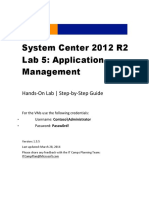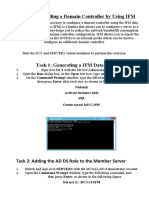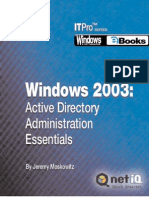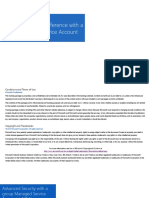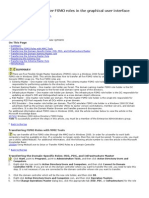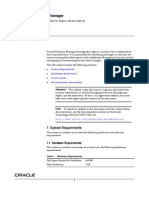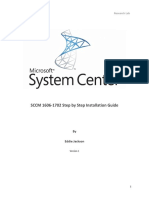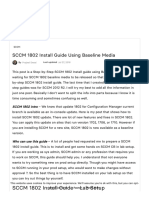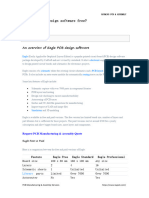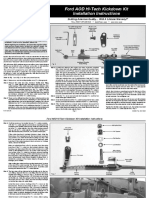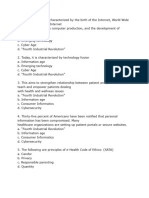WorkshopPLUS –
System Center
Operations Manager
Module 1 – SCOM Architecture
Overview
Student Lab Manual
Version 1801
�Conditions and Terms of Use
Microsoft Confidential
This training package is proprietary and confidential, and is intended only for uses described in the training
materials. Content and software is provided to you under a Non-Disclosure Agreement and cannot be
distributed. Copying or disclosing all or any portion of the content and/or software included in such packages is
strictly prohibited.
The contents of this package are for informational and training purposes only and are provided "as is" without
warranty of any kind, whether express or implied, including but not limited to the implied warranties of
merchantability, fitness for a particular purpose, and non-infringement.
Training package content, including URLs and other Internet Web site references, is subject to change without
notice. Because Microsoft must respond to changing market conditions, the content should not be interpreted to
be a commitment on the part of Microsoft, and Microsoft cannot guarantee the accuracy of any information
presented after the date of publication. Unless otherwise noted, the companies, organizations, products,
domain names, e-mail addresses, logos, people, places, and events depicted herein are fictitious, and no
association with any real company, organization, product, domain name, e-mail address, logo, person, place, or
event is intended or should be inferred.
Copyright and Trademarks
© 2016 Microsoft Corporation. All rights reserved.
Microsoft may have patents, patent applications, trademarks, copyrights, or other intellectual property rights
covering subject matter in this document. Except as expressly provided in written license agreement from
Microsoft, the furnishing of this document does not give you any license to these patents, trademarks,
copyrights, or other intellectual property.
Complying with all applicable copyright laws is the responsibility of the user. Without limiting the rights under
copyright, no part of this document may be reproduced, stored in or introduced into a retrieval system, or
transmitted in any form or by any means (electronic, mechanical, photocopying, recording, or otherwise), or for
any purpose, without the express written permission of Microsoft Corporation.
For more information, see Use of Microsoft Copyrighted Content at
http://www.microsoft.com/en-us/legal/intellectualproperty/Permissions/default.aspx
DirectX, Hyper-V, Internet Explorer, Microsoft, Outlook, OneDrive, SQL Server, Windows, Microsoft Azure,
Windows PowerShell, Windows Server, Windows Vista, and Zune are either registered trademarks or
trademarks of Microsoft Corporation in the United States and/or other countries. Other Microsoft products
mentioned herein may be either registered trademarks or trademarks of Microsoft Corporation in the United
States and/or other countries. All other trademarks are property of their respective owners.
�Contents
LAB 1: PUSH INSTALL OPERATIONS MANAGER AGENT..................................................................................
TASK 1: PUSH AGENT.....................................................................................................................................1
LAB 2: MANUALLY INSTALL OPERATIONS MANAGER AGENT.........................................................................
TASK 1: ALLOW MANUAL AGENT INSTALL IN OPERATIONS CONSOLE.......................................................................5
TASK 2 - INSTALL AGENT WITH AGENT SETUP WIZARD ON DOMAIN CONTROLLER DC-01............................................6
TASK 3 – APPROVE MANUAL AGENT INSTALL......................................................................................................8
TASK 4 – SET HSLOCKDOWN ON DOMAIN CONTROLLER.......................................................................................9
TASK 5 – INSTALL ACTIVE DIRECTORY HELPER OBJECTS (OOMADS) ON DOMAIN CONTROLLER.................................11
LAB 3: MANAGING AGENTS IN THE OPERATIONS CONSOLE.........................................................................
TASK 1: INSTALL SQL MANAGEMENT STUDIO...................................................................................................12
TASK 2: CHANGE THE PRIMARY MANAGEMENT SERVER FOR SQL-01 AND SQL-02.................................................13
TASK 3: VIEW REMOTELY MANAGEABLE SETTING IN SQL MANAGEMENT STUDIO (OPTIONAL EXTENSION).............16
© 2016 Microsoft Corporation
Microsoft Confidential
� Module 2: OMS on-boarding Connected Sources 1
Lab 1: Push Install Operations Manager Agent
Introduction
In this lab, you will push install the Operations Manager agent from the Operations
Console to the two SQL Servers.
Objectives
After completing this lab, you will be able to:
Deploy an Operations Manager agent from the Operations Console
Prerequisites
System Center Operations Manager
Ensure all services with the startup type "Automatic" are started. If not please
start these services.
Estimated Time to Complete This Lab
15 minutes
Task 1: Push Agent
1) Sign in to ms-01
a) User = Contoso\SCOMAdminUser
b) Password = Password1
2) Open the Operations Manager Console from the icon on the taskbar
© 2016 Microsoft Corporation
Microsoft Confidential
�2 Module 2: OMS on-boarding Connected Sources
3) Go to the Administration Blade, Device Management, Agent Managed and confirm that
there are no agents deployed
4) Right click Agent Managed and click Discovery Wizard
5) Select Windows computers and click Next
© 2016 Microsoft Corporation
Microsoft Confidential
� Module 2: OMS on-boarding Connected Sources 3
6) Select Advanced Discovery and settings as below:
a) Computer and Device Classes set to Servers Only
b) Management Server set to MS-02.contoso.com
© 2016 Microsoft Corporation
Microsoft Confidential
�4 Module 2: OMS on-boarding Connected Sources
7) On the Discovery Method tab, click Browse for, or type-in computer names. Type in
the following and then click Next:
a) Sql-01.contoso.com and hit enter
b) Sql-02.contoso.com
8) On the Administrator Account tab, enter the following details and click Next:
a) User Name = SCOMAdminUser
b) Password = Password1
c) Domain = Contoso
9) Both SQL Servers should be discovered – select both computers and click next
10) Click Finish
11) The Agents will now be installed. Keep the window open until you see Success next to
both installs.
12) Click Close
13) In the Operations Console (Administration Blade) under Agent Managed you will now see
both SQL Servers. They will be listed as Not Monitored until the discoveries have run:
© 2016 Microsoft Corporation
Microsoft Confidential
� Module 2: OMS on-boarding Connected Sources 5
Lab 2: Manually Install Operations Manager Agent
Introduction
In this lab, you will manually install the Operations Manager agent from the
Operations Console to the two Domain Controllers.
Objectives
After completing this lab, you will be able to:
Enable Operations Manager to allow Manual Agent Installs
Manually deploy an Operations Manager agent
Configure a Domain Controller using HSLockdown
Prerequisites
System Center Operations Manager
Ensure all services with the startup type "Automatic" are started. If not please
start these services.
Estimated Time to Complete This Lab
30 minutes
Task 1: Allow Manual Agent Install in Operations
Console
1) Sign in to ms-01
a. User = Contoso\SCOMAdminUser
b. Password = Password1
2) Open the Operations Manager console
3) Go to the Administration blade
4) When the Operations Manager console has opened, go to Administration, Settings,
Security
© 2016 Microsoft Corporation
Microsoft Confidential
�6 Module 2: OMS on-boarding Connected Sources
5) Double click Security and change the setting to Review new manual agent installations
in pending management view
Ensure that the Automatically approve new manually installed agents remains not
checked
6) Click OK
© 2016 Microsoft Corporation
Microsoft Confidential
� Module 2: OMS on-boarding Connected Sources 7
Task 2 - Install Agent with Agent Setup Wizard on
Domain Controller dc-01
1. Log on to dc-01.contoso.com as contoso\administrator with a password of
Password1
2. Open file explorer and in the address bar at the top, enter \\ms-01\e$ as shown
below:
3. Open the SCOM Source Files ISO folder
4. Right click Setup and choose Run As Administrator
5. In Optional Installations, click Local agent.
6. On the Welcome page, click Next
7. On the License windows click I agree
8. On the Destination Folder page, leave the installation folder set to the default, and
then click Next.
9. On the Agent setup window page, select Connect the agent to System Center
Operations Manager and click Next
© 2016 Microsoft Corporation
Microsoft Confidential
�8 Module 2: OMS on-boarding Connected Sources
10. On the Management Group Configuration page, do the following:
a. Type the name of the management group in the Management Group Name
field – SCOMProd
b. Type the Management Server name in the Management Server field: ms-
02.contoso.com
c. For Management Server Port, leave the default of 5723.
d. Click Next.
© 2016 Microsoft Corporation
Microsoft Confidential
� Module 2: OMS on-boarding Connected Sources 9
11. On the Agent Action Account page, leave it set to the default of Local System and
then click Next.
12. On the Ready to Install page, review the settings and then click Install to display the
Installing System Center Operations Manager Agent page.
13. When the Completing the Operations Manager Agent Setup Wizard page appears,
click Finish.
Task 3 – Approve Manual Agent Install
You now need to approve the manual agent install so that it can be managed by the
Operations Manager management group
1. Log on to ms-01.contoso.com as contoso\scomadminuser with a password of
Password1
2. Open the Operations Manager console
3. Go to Administration, Device Management, Pending Management – you will see the
agent that we just manually installed
4. Select the agent and click Approve (you can also right click the agent and choose
approve)
© 2016 Microsoft Corporation
Microsoft Confidential
�10 Module 2: OMS on-boarding Connected Sources
5. When prompted for confirmation, click Approve
6. The Agent will now show up under Administration, Device Management, Agent
Managed
7. For manual agent installs on servers that are not Domain Controllers, this is all that
needs doing. For manual agent installs on Domain Controllers there is additional
configuration required.
8. REPEAT the above steps for DC-02 to manually install the operations manager agent
on to the second domain controller.
Task 4 – Set HSLockdown on Domain Controller
1. Log back on to dc-01.contoso.com as contoso\administrator with a password of
Password1
2. Open an elevated command-prompt (right click the start button and choose
Command Prompt (Admin))
© 2016 Microsoft Corporation
Microsoft Confidential
� Module 2: OMS on-boarding Connected Sources 11
3. Change the directory to C:\Program Files\Microsoft Monitoring Agent\Agent
4. Type hslockdown /L in order to get a list what accounts are authorized to monitor
the DC.
5. As you can see the account LocalSystem is denied access
6. Change it like this: hslockdown /A "NT Authority\System"
© 2016 Microsoft Corporation
Microsoft Confidential
�12 Module 2: OMS on-boarding Connected Sources
7. Restart the Health Service. You can do this from the command prompt by:
a. Net Stop HealthService
b. Net Start HealthService
8. Repeat the above steps for DC-02
Task 5 – Install Active Directory Helper Objects
(OOMADs) on Domain Controller
If you have Domain Controllers running Windows Server 2008 R2 or earlier then you
will also need to install the ooMADs.msi. This is because the Active Directory
Management Pack for monitoring Windows Server 2008 R2 and earlier Domain
Controllers requires this helper object.
If you have Windows Server 2012 (or later) Domain Controllers then you can use
version the MP version is 10.0.1.0 (or later) of the Active Directory Management Pack
and you do not need to do the following.
For this lab there is no need to do the following. It is included for completeness
only as an example of what you might have to do in your environment.
1. Copy OOMADs.msi from MS: "E:\Program Files\Operations Manager\Server\
AgentManagement\amd64\OOMADs.msi" on an Operations Manager Management
Server
2. Paste to the Domain Controller you want to monitor in "C:\Program Files\Microsoft
Monitoring Agent\Agent\HelperObjects"
3. Open an elevated command prompt
4. Run: "C:\Program Files\Microsoft Monitoring Agent\Agent\HelperObjects\
OOMADs.msi"
5. Once finished, check if file exists: "C:\Program Files\Common Files\Active Directory
Management Pack Objects\oomads.dll"
6. Restart the Microsoft Management Agent on the Domain Controller.
© 2016 Microsoft Corporation
Microsoft Confidential
� Module 2: OMS on-boarding Connected Sources 13
Lab 3: Managing Agents in the Operations Console
Introduction
In this lab, you will manage agents in the administration blade of the Operations
Console.
Objectives
After completing this lab, you will be able to:
Change the Primary Management Server of an agent installed from the
Operations Console
Uninstall an agent from the Operations Console
Personalize the Operations Console so that you can see which agents have been
manually installed
Using SQL Management Studio to view which agents have been manually
installed.
Prerequisites
System Center Operations Manager
Ensure all services with the startup type "Automatic" are started. If not please
start these services.
Estimated Time to Complete This Lab
15 minutes
Task 1: Install SQL Management Studio
1) Sign in to win-10
a) User = Contoso\SCOMAdminUser
b) Password = Password1
2) Open File Explorer and go to e:\SQL Server 2016 Management Studio
3) Right click SSMS-Setup-ENU and click Run As Administrator
4) When prompted to allow this app to make changes to your device, click Yes
© 2016 Microsoft Corporation
Microsoft Confidential
�14 Module 2: OMS on-boarding Connected Sources
5) Click Install. It will take approximately 10 minutes to install but you can continue with
Task 2 while the install completes.
Task 2: Change the Primary Management Server for
SQL-01 and SQL-02
1) On win-10, open the Operations Manager console and go to Administration, Device
Management, Agent Managed
2) You will notice that SQL-01 and SQL-02 both have their Primary Management Server
set as MS-02.contoso.com
3) Right click SQL-01 and choose Change Primary Management Server
4) Select MS-01.contoso.com and click OK
5) Right click SQL-02 and choose Change Primary Management Server
6) Select MS-01.contoso.com and click OK
7) Right click DC-01 (or DC-02) and you will see that the option to Change Primary
Management Server is greyed out (as are the options to repair and uninstall). This is
because DC-01 and DC-02 were manually installed.
© 2016 Microsoft Corporation
Microsoft Confidential
� Module 2: OMS on-boarding Connected Sources 15
8) Go to the monitoring blade and drill down through the Operations Manager folder,
then Agent Details and select the Agents by Version state view
9) Right click anywhere within the white area of the Agents By Version pane and choose
Personalize View
© 2016 Microsoft Corporation
Microsoft Confidential
�16 Module 2: OMS on-boarding Connected Sources
10) Select Is Manually Installed and click OK
11) The view should now update as follows:
© 2016 Microsoft Corporation
Microsoft Confidential
� Module 2: OMS on-boarding Connected Sources 17
12) Hopefully the SQL Management Studio install has completed. If not, just wait a few
minutes longer. If it has completed, click close on the install window.
Task 3: View Remotely Manageable setting in SQL
Management Studio (OPTIONAL EXTENSION)
1) Open SQL Management Studio by click start, Microsoft SQL Server 2016, Microsoft
SQL Server Management Studio
2) For Server name, type in SQL-01 and click Connect – this will connect to the SQL
Server hosting the Operations Manager database
3) Drill down through Databases, OperationsManager, Tables
© 2016 Microsoft Corporation
Microsoft Confidential
�18 Module 2: OMS on-boarding Connected Sources
4) Find the table dbo.MT_HealthService – click it once to select it. Then click the New
Query button on the task bar
5) To see which agents are manually installed, copy and paste the following code into
the window and click Execute
select bme.DisplayName from MT_HealthService mths
INNER JOIN BaseManagedEntity bme on bme.BaseManagedEntityId
= mths.BaseManagedEntityId
where IsManuallyInstalled = 1
6) More details are available here -
https://blogs.technet.microsoft.com/kevinholman/2010/02/20/how-to-get-your-
agents-back-to-remotely-manageable-in-opsmgr-2007-r2/
© 2016 Microsoft Corporation
Microsoft Confidential




